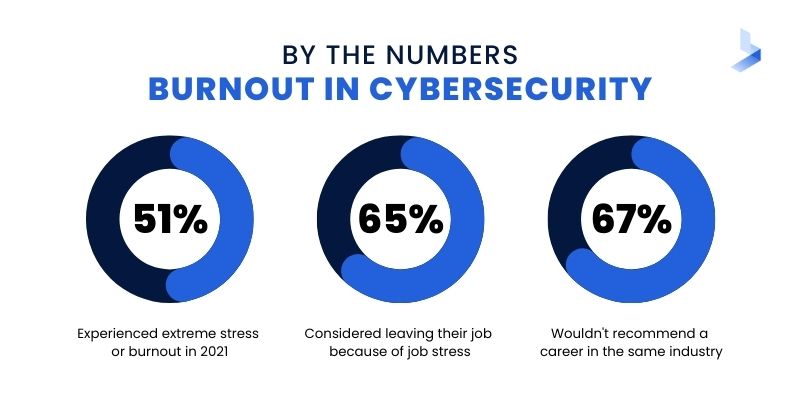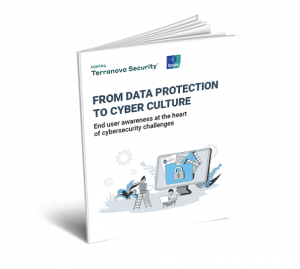Even though your cyber heroes only work from 9-5, cyber threats are lurking 24/7.
Many dangers can materialize online, requiring constant monitoring and security operations professionals to keep up with and potentially mitigate the latest threats and vulnerabilities.
And with the rapid increase in global cyber attacks, the stress for cyber security professionals is through the roof.
Because of the intense demands in the field and the burnout that plagues the industry, job openings for cyber security experts are at an all-time high—and the demand won’t slow down anytime soon.
According to the Bureau of Labor and Statistics, information security analysts are seeing a job growth rate of 35% by 2031.
However, there is also a huge talent drought in the industry. Cybersecurity Ventures estimated a 350% growth in unfilled positions between 2013 and 2021, with 3.5 million job vacancies remaining in 2023.
The reasons for the lack of talent in cyber security are vast, but one major culprit is cyber security burnout because of the intense job-related demands.
A recent Forrester blog revealed that 66% of cyber security professionals experienced extreme stress or burnout, and 51% were prescribed medication for their mental health.
In this article, we discuss cyber security burnout, the contributing factors, and how to avoid it so you can foster a healthy work culture for your cyber heroes.
What is Cyber Security Burnout, and How Does it Happen?
Cyber security burnout is a state of mental, physical, and emotional exhaustion caused by excessive and prolonged exposure to the stresses of working in the cyber security field.
It can lead to feelings of cynicism, detachment, and apathy. Burnout can eventually result in complete disengagement from one's work, which may also be another cyber security risk.
Symptoms of cyber security burnout include:
- Feeling overwhelmed by the never-ending stream of cyber threats and cyber security trends
- Feeling constantly on edge and anxious about potential attacks
- Losing interest in and enjoyment of work
- Becoming cynical or pessimistic about the prospects of preventing or deterring cyber attacks
- Feeling detached from colleagues and/or others (including family and friends)
With the constant threat of cyber attacks and the never-ending stream of news about major data breaches, it's no wonder cyber security professionals are at risk of burning out.
So how does it happen? How does someone passionate about cyber security and protecting others from online threats start to feel overwhelmed and exhausted?
Key Factors that Contribute to Cyber Security Burnout
Here are some of the most common sources of burnout for cyber security professionals:
Increased Cyber Crime
As a cyber security professional, you can't let your guard down for a single minute. You must be constantly on the lookout for new threats and vulnerabilities. The need for constant vigilance means it's difficult to rest easy knowing that your systems may not be secure.
Lack of Control
There is a lot you can't control or predict when it comes to cyber security. You can't know the actions of hackers or the motives of someone who might want to exploit vulnerabilities in your systems.
Isolation
Cyber security can be an isolating job. You may not have colleagues who understand the technical aspects of your work or its significance. This can cause you to feel like you're the only one who cares about cyber security in your organization.
Unrealistic Expectations and Lack of Appreciation
Cyber security is a complex field that's constantly evolving. There's pressure on people in this field to keep learning and stay on top of every new development. Despite this extra effort, some organizations don't show appreciation or give credit to the cyber heroes performing this vital work daily.
Excessive Working Hours
According to a report conducted by Tessian, 100% of Chief Information Security Officers (CISOs) work extra hours every week, on average clocking 11 additional hours per day. About 1 in 10 CISOs work an extra 20-24 hours per week.
The Risks of Cyber Security Burnout
Considering all these factors, it's no surprise that burnout is at an all-time high in the cyber security field. And it's not just the bigwigs who are at risk. Junior staff and students are also susceptible.

Cyber security burnout statistics by BitLyft
So why should employers care about cyber security burnout? Because it creates a real and present danger for employers, feeling the rise of four main risks:
- Compromised security: When employees are burned out, they're more likely to make mistakes that can jeopardize the security of your systems. According to a recent study, human error is one of the leading causes of data breaches.
- Decreased productivity: Cyber security burnout can lead to reduced productivity as employees struggle to keep up with the demands of their job.
- High employee turnover: The stresses of cyber security burnout can force employees to leave to find less taxing work. As a result, your cyber security department risks facing instability, lack of expertise, and hiring challenges.
- Legal liabilities: Your company could be liable if an employee makes a mistake resulting in a data breach or other security incident.
5 Tips to Avoid Cyber Security Burnout
The good news is there are ways to combat burnout and stay mentally and physically healthy. Here are some tips to help prevent cyber security burnout among your employees.
Use Security Automation to Support Your Human Analysts
No matter how many technological security layers you have in place, it only takes one employee to click on a malicious link or open a malicious attachment to potentially bring down your entire operation. That constant risk of something happening can be stressful for your cyber security teams.
That’s why organizations are increasingly turning to security automation to help shore up their defenses. By automating repetitive and mundane tasks, security analysts can rest easier and free up time to devote their expertise to more strategic tasks.
Outsource Some Security Tasks
Cyber security professionals who are feeling overworked need more help. Outsourcing less critical tasks can relieve some of the work burden and reduce the risk of burnout. When cyber heroes feel confident that an outsourcing firm is protecting organizational data and systems, they can focus on other critical tasks.
Another benefit of outsourcing is that it provides access to a larger talent pool. By working with a security provider, businesses can tap into a team of experts who religiously keep up with the latest threats and vulnerabilities.
This way, organizations can be sure that their data and systems are always protected against the latest threats.
Create a Comprehensive Security Plan
With so many potential cyber threats, and new ones emerging all the time, it can be challenging to know how to protect yourself. This feeling of being constantly on alert can often lead to burnout.
Creating a comprehensive security plan helps ease some of this burden. It provides a clear and concise overview of the steps to keep data and systems safe.
By taking the time to sit down and create a plan, you ensure that you cover all the bases and reduce the chances of becoming overwhelmed or burning out.
Don't Have Unrealistic Expectations for Cyber Security Professionals
When people are constantly being told that they need to be “on the lookout” for new threats, it can lead to feelings of anxiety and inadequacy. It’s important to remember that no one is perfect, and it’s impossible to anticipate every threat.
People in the cyber security field are people, too. They have families, need rest, and work best in optimal health and wellness. Employers can help by eliminating long work hours, setting realistic expectations regarding workloads, and focusing on employee wellness.
Ease the Workload with Cyber Security Awareness
The constant threat of cyber attacks and the need to constantly update security measures can be overwhelming for even the most experienced IT professionals.
Take some burden off your IT team by ensuring your organization is cyber-aware. When the organization as a whole recognizes the importance of cyber security, your IT team doesn't feel so isolated and can focus on other priorities instead of constantly putting out fires.
What Organizations Can Do to Help Reduce Cyber Security Burnout
A recent study by Fortra’s Terranova Security and Ipsos revealed that 52% of employees think cyber security isn’t part of their job duties.
An even higher percentage – 78% – say the company is responsible for its cyber security safety. When IT staff bear that full burden themselves, cyber security burnout isn’t far behind.
The challenge is to flip the script on those stats. Management and employees need to understand that cyber security impacts everyone. The IT department can’t do everything, and cyber security is everyone’s job. That’s especially true when you realize that human error causes most cyber security breaches.
One of the most common attack vectors cyber criminals use to steal or compromise company data is on everyone’s desktop: Employee emails.
Everyone at an organization can help ease the rising pressure on their IT team by learning to recognize and avoid malicious emails from cyber criminals.
The best way to do this is through phishing simulations and exercises. When employees have training in cyber security, they understand the potential consequences of a breach and their role in preventing them.
Cyber security professionals feel supported and optimistic when they see their colleagues sharing in the security task.
Phishing simulations are the first step in a broader cultural shift that eases the pressure on overworked IT pros. Forward-thinking management should implement a cyber security awareness program and encourage cyber security best practices throughout the organization.
Reducing Cyber Security Burnout Helps Reduce Cyber Security Risk
With cyber threats on the rise, and more duties falling to cyber security professionals every day, it makes sense that workplace burnout is growing. However, that's a dangerous position for organizations to be in. To keep their systems and data safe, they need happy and healthy employees.
The good news is that measures to reduce burnout are the same ones that strengthen your security perimeter.

Promoting a cyber-aware company culture is the best way to avoid or alleviate cyber security burnout
For more on phishing risks and how employee training can shore up the efforts of your IT team, read our full report, From Data Protection to Cyber Culture.